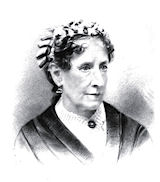A letter to Mrs. Shepherd Brown:
New Orleans, Nov. 17th, 1862.
Dear Mrs. B–––:
I have nothing to say, and might not say it if I did have it, for you know there is a heaviness prevailing in this latitude, which is not favorable to expansion of idea. I only send a line to remind you that I live and wish you to remember me. A dull and heavy anxiety has settled upon us. We hear nothing upon which we can rely, and know nothing to which we can cling with comfort. Those who come in say there is much joy beyond the lines, but no one can give the why and wherefore. In the meantime we are leading the lives which women have lead since Troy fell; wearing away time with memories, regrets and fears; alternating fits of suppression, with flights, imaginary, to the red fields where great principles are contended for, lost and won; while men, more privileged, are abroad and astir, making name and fortune and helping to make a nation. There was a frolic on board the English ship a few nights since for the benefit, the Delta says, of Secession women. I did not go, though Miss Betty Callender offered her services in the way of invitation. I am told that the contraband “bonny-blue flag” waved freely over seas of red wine and promontories of sugar-work. The ship represents secessiondom just now; it has not a stronghold in the city. Many a lady opened her vial of wrath, I suppose, for all were told that freedom of speech should be the order of the night. There was acting and dancing, and fish, flesh and fowl suffered in the name of our cause. Toasts were drunk to our great spirits to whom it seems the destiny of a nation is entrusted. How my heart warms to the weary, battle-stained heroes. I never fancied carpet knights even before the stern trial came.
I can’t tell you what a life of suppression we lead. I feel it more because I know and feel all that is going on outside. I am like a pent-up volcano. I wish I had a field for my energies. I hate common life, a life of visiting, dressing and tattling, which seems to devolve on women, and now that there is better work to do, real tragedy, real romance and history weaving every day, I suffer, suffer, leading the life I do.
The Episcopal clergy are true. Three have been sent to prison, the rest are under marching orders. When the ship was leaving, Mr. Fulton’s last cry was, “When I return the Confederate flag will wave over New Orleans. Hurrah for Jeff Davis!” You will feel an interest I hope in my poor, dilapidated brother if you see him. He looks rough because he neglects his appearance, but there is no truer gentleman than he, no truer, braver or less selfish. I long so to see him and render the service he must need with only one arm. Things go on just as they did. Daily life presents the same food for sorrowful reflection. Tiger, Jake and Emma hold their own within doors, and nothing has happened to prevent us from parading the streets without. A shrill horn breaks often upon my sad speculations. I rush out perhaps and sometimes find a train of striped and bestarred cavalry and sometimes only an orange cart. “What an age we live in,” says philosophy, and goes in again to repine and wonder. The Advocate was suppressed an hour or two ago, but the pliant Jacob made haste to smooth his phrases. A quarrel is reported between the French admiral and the General. There has been a great commotion about the money sent from the New Orleans bank. Lemore has gone to prison and some others. Where are our people? Can’t you contrive to let me into the secret, if you have any? You can’t read if I keep on, so good-bye, with best wishes to all.
Ever your friend,
J. E. LeGrand.










